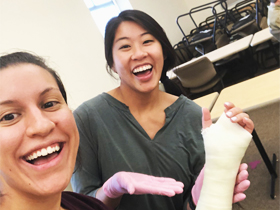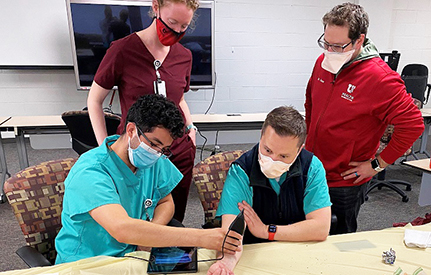
Educational Formats
Dedicated Teaching Conferences
- Intern Survival Skills Held every Friday afternoon for interns during their first year; focusing on crucial inpatient and outpatient topics. This includes Intern Support Group during the first hour, and individualized Spanish language training and ultrasound simulation training during the latter part of the intern year.
- Wednesday Afternoon Teaching Sessions (WATS) An entire afternoon teaching conference every week for all Family Medicine resident class years
- Grand Rounds Monthly presentation on current clinical topics given by third-year residents
- Clinic Quality Meeting Monthly quality improvement meeting to discuss improvement projects for clinic. Projects are led by third-year residents
- Journal Club/Patient Safety Conference Presentations are held regularly and are presented by second and third-year residents. Patient Safety Conferences are case-based
- Inpatient Teaching Conferences Opportunities to attend on all inpatient service rotations
- Retreats & Workshops
- R1 Retreat: Held in early October, at a beautiful resort setting in Park City , focusing on resident wellness
- R1 Leadership Workshop: Held in April to prepare interns for increasing leadership roles as PGY2 residents
- R2 Retreat: Held in mid-May, returning to a mountain resort in Park City, focusing on career planning, and financial wellness planning
- R3 Retreat: Held in early June, to reflect on residency experience, and preparing to launch into the next stage of a medical career

Comprehensive Curriculum
- Adult medicine, women’s health care and obstetrics, pediatrics, musculoskeletal medicine, behavioral medicine, health parity, public health, under-resourced, geriatrics, leadership, wellness, evidence-based medicine, leadership skills, and quality improvement are all core components of the structured curriculum. Unique aspects of training include instruction in ultrasound (basic musculoskeletal and obstetric), Spanish language, medication-assisted treatment (MAT) for opioid use disorder, hepatitis C treatment, HIV PrEP, and transgender care.
Procedural Training
- Opportunities to learn procedures in continuity practice sites, specialty rotations, and hospital-based rotations. Procedures include: endometrial biopsy, lumbar puncture, intrauterine devices, neonatal circumcision, ICU care, dermatologic excision and repair, laceration repair, abscess I&D, toenail removal, orthopedic aspiration and injection, ultrasound, vasectomy, colposcopy, and cryotherapy
- Program support for ACLS, NRP, ALSO, and PALS
Residents as Teachers
Residents learn to teach through presentations at WATS, Intern Survival Skills, Grand Rounds, Journal Club, Patient Safety Conference, as well as through supervising other learners. Residents help to supervise and teach medical students and physician assistant students as a core component of providing inpatient and outpatient care.
Our residents learn quality improvement skills through a structured didactic curriculum, culminating in co-leading an interprofessional team in a year-long quality improvement project during the R3 year. All PGY3 residents develop posters summarizing their projects and findings, and present these results regionally; many even present nationally. Residents also have the opportunity to pursue additional scholarship projects in areas of their particular interest and passion, with guidance from faculty mentors.

